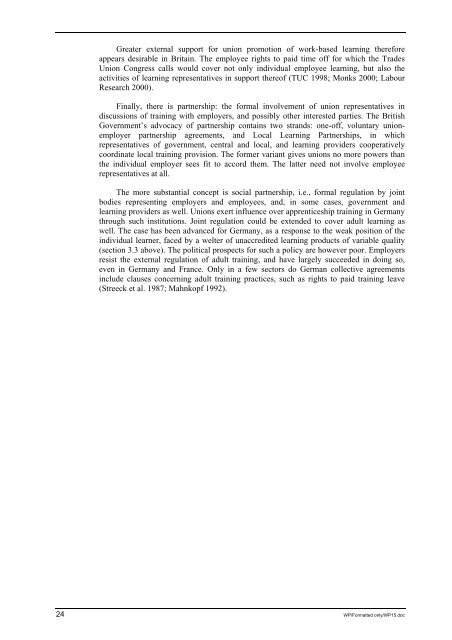Lifelong learning - International Labour Organization
Lifelong learning - International Labour Organization
Lifelong learning - International Labour Organization
Create successful ePaper yourself
Turn your PDF publications into a flip-book with our unique Google optimized e-Paper software.
Greater external support for union promotion of work-based <strong>learning</strong> therefore<br />
appears desirable in Britain. The employee rights to paid time off for which the Trades<br />
Union Congress calls would cover not only individual employee <strong>learning</strong>, but also the<br />
activities of <strong>learning</strong> representatives in support thereof (TUC 1998; Monks 2000; <strong>Labour</strong><br />
Research 2000).<br />
Finally, there is partnership: the formal involvement of union representatives in<br />
discussions of training with employers, and possibly other interested parties. The British<br />
Government’s advocacy of partnership contains two strands: one-off, voluntary unionemployer<br />
partnership agreements, and Local Learning Partnerships, in which<br />
representatives of government, central and local, and <strong>learning</strong> providers cooperatively<br />
coordinate local training provision. The former variant gives unions no more powers than<br />
the individual employer sees fit to accord them. The latter need not involve employee<br />
representatives at all.<br />
The more substantial concept is social partnership, i.e., formal regulation by joint<br />
bodies representing employers and employees, and, in some cases, government and<br />
<strong>learning</strong> providers as well. Unions exert influence over apprenticeship training in Germany<br />
through such institutions. Joint regulation could be extended to cover adult <strong>learning</strong> as<br />
well. The case has been advanced for Germany, as a response to the weak position of the<br />
individual learner, faced by a welter of unaccredited <strong>learning</strong> products of variable quality<br />
(section 3.3 above). The political prospects for such a policy are however poor. Employers<br />
resist the external regulation of adult training, and have largely succeeded in doing so,<br />
even in Germany and France. Only in a few sectors do German collective agreements<br />
include clauses concerning adult training practices, such as rights to paid training leave<br />
(Streeck et al. 1987; Mahnkopf 1992).<br />
24 WP/Formatted only/WP15.doc

















